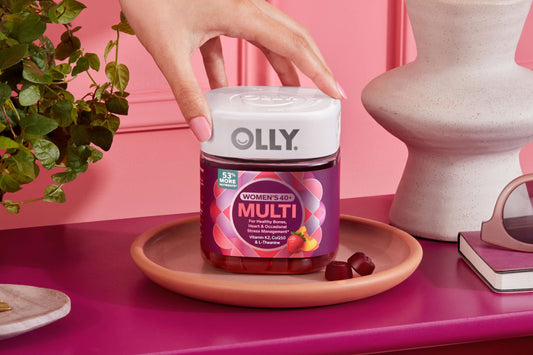At OLLY, science isn't just about data points—it's about real women navigating real health challenges. We sat down with Dr. Shikha Snigdha, our Senior Director of Scientific Affairs, to explore her journey from curious young scientist to one of the leading voices in women's health supplementation. From demystifying perimenopause to championing rigorous clinical research for OLLY’s first menopause product, Shikha shares her passion for making complex science accessible and actionable.
The Goods Inside
- Meet the Brain Behind the Brand
- Breaking New Ground with Clinical Research
- The Science Behind Mellow Menopause™
- Women’s Health Is Having Its Moment
- Introducing Balanced Perimenopause: A First-of-Its-Kind Approach
- Making Complex Science Simple: The Wi-Fi Analogy
- The Science Behind Balanced Perimenopause
- Supporting Women Through Every Life Stage
- Advice for Young Women in STEM
Meet the Brain Behind the Brand
Q: Let's start with introductions. Can you tell us about yourself and your role at OLLY?
Q: What's something that you're especially proud of?
Shikha: I think the work that I'm really proud of—and I think as a team, we should all be excited about—is what we were able to do with Mellow Menopause™ in bringing some very complex science to life with a product that reaches our consumers. That clinical trial was the first for OLLY, and I'm so excited about what we found.
Breaking New Ground with Clinical Research
Q: Can you tell us about the groundbreaking clinical trial for Mellow Menopause™?
Shikha: That was OLLY's first clinical trial.1 What we were trying to do is take a couple of complex ingredients, look at their mechanism of action, and bring them together in a product that would provide meaningful benefits to women experiencing menopause.
What we found was remarkable. In the clinical study—which means these are real women experiencing the same kinds of symptoms that women who reach for a menopause product will have—we tested it with them and found that they saw meaningful changes and meaningful benefits in things like hot flashes, mood swings, and menopause-associated headaches.1
“We saw the effects in a matter of days, unlike most products where you see effects over weeks or months.”
Q: Why are clinical trials so important in the supplement space?
Shikha: Clinical trials, especially in dietary supplements, are like putting your money where your mouth is. You say these products are going to help you. You believe the products are going to help you. You formulate for efficacy. And now how do you really show that? The only way to show that is to be able to prove it out in clinical trials. Clinical trials help consumers move from hope to trust.

The Science Behind Mellow Menopause™
Q: Let's dive into Mellow Menopause™. What's in it, and how does it work?
Shikha: Mellow Menopause™ has two separate classes of ingredients. There's EstroG-100, which is a botanical blend that has been used to support menopause for a long, long time in Asian countries. There are more than five clinical studies on that ingredient alone.
Then we added GABA to it, which is a neurotransmitter—an inhibitory neurotransmitter. The easiest way to understand it, is that it’s something that allows your brain to slow down. So, it's like putting a brake pedal on the brain's activity. It slows down what's happening so that you don't experience the same sort of symptoms.
Q: So, Mellow Menopause™ is unique because of that GABA addition?
Shikha: OLLY's product is unique because of the GABA addition and because of the clinical testing we did, which proves that this product really works.

Women's Health Is Having Its Moment
Q: From your POV, why is menopause so hot right now?
Shikha: I think women's health in general is having its moment, which is very exciting for me as a scientist. There was a time when most studies were done just on men, and you just automatically assumed everything that works on men will work the same way for a woman. That's not how it works.
Women are not small men or petite versions of men. They have different experiences, and they have different needs. You're seeing an increase in women's health focus earlier on—for daily wellness support, for menstrual cycle support—and to me, menopause is an extension of that. We're now recognizing the varied, full spectrum needs of women.
Introducing Balanced Perimenopause: A First-of-Its-Kind Approach
Q: Speaking of doubling down on women's health, let's talk about Balanced Perimenopause. What's in it, and what does it do?
Shikha: Perimenopause is such a long period in a woman's life. It’s that pre-period when you should be trying to intervene so that you have a better outcome by the time you reach menopause.
We wanted to provide support to women who are experiencing symptoms, not really feeling like themselves, but they just don't know what's off. They have mood disruptions and sleep issues, but their periods haven't stopped yet. They’re still in that phase of disruption, which can last anywhere between 7 and 11 years.
Making Complex Science Simple: The Wi-Fi Analogy
Q: You do such a great job of making it very clear to understand the difference between perimenopause and menopause. Can you explain it like we're five years old?
Shikha: Think about trying to go on vacation to the middle of a forest or the middle of a lake where you're not going to have Wi-Fi. Menopause is that vacation destination. You've reached a place where you have no Wi-Fi—there's no estrogen. That supply has been cut off.
Perimenopause is the transition period between destinations. It’s the journey from A to B. It happens when the signals start going on and off. Getting to the middle of the forest, you have phases where your signal’s on and your signal's off. You have estrogen fluctuations—the levels are up; the levels are down. Your periods are longer cycles, then shorter cycles. But you still have estrogen in the system. There’s periods of time where there's absolutely zero signal. That is perimenopause.
The Science Behind Balanced Perimenopause
Q: Let's talk about the formulation of Balanced Perimenopause.
Shikha: Balanced Perimenopause is a very special product that has two clinically studied ingredients that work well together. The first? A clinically studied version of a mineral called chromium.
The second is a clinically studied fenugreek extract that was evaluated in perimenopausal women and showed better management of estrogen levels across the study in women who took that product.
So, Balanced Perimeno has these two clinically studied ingredients that work well to support women as they see these hormone fluctuations, as they see estrogen fluctuations, as they see changes in metabolism, and as they start to see hot flashes and mood swings.
Supporting Women Through Every Life Stage
Q: Beyond perimenopause and menopause, can you speak about how OLLY supports women through every era of life?
Shikha: OLLY has a unique approach to how we bring science to life with our products. We have simple products. What we're not trying to do is just add more for the sake of more. We're very thoughtful in how we design the products and how we craft the formulations themselves. We have a whole spectrum of expertly formulated support for women. We start with Teen Multi, then we offer PMS support with Period Hero, daily multivitamins for women, and offer support through perimenopause and menopause.

Q: Can you talk about OLLY’s formulation team?
Shikha: Our head of science and head of R&D is a woman. Everyone in the OLLY Scientific Affairs team is a woman. We come together to craft these products. Both Mellow Menopause™ and Balanced Perimenopause have been created by women who get it.
“We discuss what the critical needs of women in perimenopause are, and we come together as a team to try and address those specific needs. We don't just put together a few trending ingredients. We're very mindful in how we design the product.”
Advice for Young Women in STEM
Q: What advice would you give to young women who want to pursue a career in STEM?
Shikha: Stay in the game. What happens is, you have an undergraduate class of about 55% women. By the time you're in a master's program, you're at 40%. At the PhD level, you're already at 29-30%. But by the time you're hitting leadership roles in STEM, you're at 19%.
People don't see female role models, so they think it's not possible. I would encourage those women to just stay in the game.
References:
*These statements have not been evaluated by the Food and Drug Administration. This product is not intended to diagnose, treat, cure, or prevent any disease.
1 Snigdha, S., Lau, E., Ademola, J., Frost, R., & Patel, P. (2025). Effect of a novel nutraceutical combination of EstroG‑100 and γ‑aminobutyric acid (GABA) in attenuating symptoms of menopause in healthy adult women: a randomized double-blinded placebo-controlled study. Menopause (New York, N.Y.), 10.1097/GME.0000000000002608. Advance online publication. https://doi.org/10.1097/GME.0000000000002608 Opens in new window





